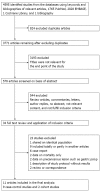Acid suppressive drugs and gastric cancer: a meta-analysis of observational studies
- PMID: 23674860
- PMCID: PMC3646149
- DOI: 10.3748/wjg.v19.i16.2560
Acid suppressive drugs and gastric cancer: a meta-analysis of observational studies
Abstract
Aim: To evaluate the association between acid suppressive drug use and the development of gastric cancer.
Methods: A systematic search of relevant studies that were published through June 2012 was conducted using the MEDLINE (PubMed), EMBASE, and Cochrane Library databases. The search included observational studies on the use of histamine 2-receptor antagonists (H₂RAs) or proton pump inhibitors and the associated risk of gastric cancer, which was measured using the adjusted odds ratio (OR) or the relative risk and 95%CI. An independent extraction was performed by two of the authors, and a consensus was reached.
Results: Of 4595 screened articles, 11 observational studies (n = 94558) with 5980 gastric cancer patients were included in the final analyses. When all the studies were pooled, acid suppressive drug use was associated with an increased risk of gastric cancer risk (adjusted OR = 1.42; 95%CI: 1.29-1.56, I² = 48.9%, P = 0.034). The overall risk of gastric cancer increased among H₂RA users (adjusted OR = 1.40; 95%CI: 1.24-1.59, I² = 59.5%, P = 0.008) and PPI users (adjusted OR = 1.39; 95%CI: 1.19-1.64, I² = 0.0%, P = 0.377).
Conclusion: Acid suppressive drugs are associated with an increased risk of gastric cancer. Further studies are needed to test the effect of acid suppressive drugs on gastric cancer.
Keywords: Gastric cancer; H2-receptor antagonists; Meta-analysis; Proton pump inhibitors.
Figures



References
-
- Jacobson BC, Ferris TG, Shea TL, Mahlis EM, Lee TH, Wang TC. Who is using chronic acid suppression therapy and why? Am J Gastroenterol. 2003;98:51–58. - PubMed
-
- Wolfe MM, Sachs G. Acid suppression: optimizing therapy for gastroduodenal ulcer healing, gastroesophageal reflux disease, and stress-related erosive syndrome. Gastroenterology. 2000;118:S9–31. - PubMed
-
- Marks RD, Richter JE, Rizzo J, Koehler RE, Spenney JG, Mills TP, Champion G. Omeprazole versus H2-receptor antagonists in treating patients with peptic stricture and esophagitis. Gastroenterology. 1994;106:907–915. - PubMed
-
- Vigneri S, Termini R, Leandro G, Badalamenti S, Pantalena M, Savarino V, Di Mario F, Battaglia G, Mela GS, Pilotto A. A comparison of five maintenance therapies for reflux esophagitis. N Engl J Med. 1995;333:1106–1110. - PubMed
-
- Kim JS, Chae HS, Kim HK, Cho YS, Park YW, Son HS, Han SW, Choi KY. [Spontaneous resolution of multiple fundic gland polyps after cessation of treatment with omeprazole] Korean J Gastroenterol. 2008;51:305–308. - PubMed
Publication types
MeSH terms
Substances
Grants and funding
LinkOut - more resources
Full Text Sources
Other Literature Sources
Medical

